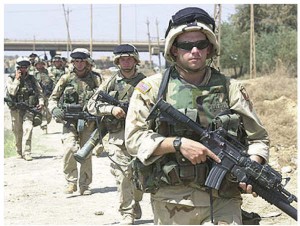Jan
12
Another Perspective on War
Filed Under PTSD, Today's War, Trauma
by Janet J. Seahorn
It is a snowy Sunday afternoon. I have been running errands, not because I have a great deal to do after the holidays; to be honest, I am merely trying to keep from thinking about the escalation of the war in Afghanistan. When I got home, Tony had posted a new message on our blog that began with “I seem to spend a lot of time thinking about war, even when I don’t want to. The reality of war. The horror of war…” With this blog he added an article from our local newspaper, The Denver Post. It was another reality check from troops actually involved in war, versus media or political rhetoric.
Every day we get emails, phone calls, or an acquaintance sharing a tragic story about a loved one, friend, or just someone they distantly know who is struggling with Post-Traumatic Stress. For those who have and are serving in the current conflict, the stories are so similar to Vietnam veterans it is down right eerie.
For some individuals the nightmares begin immediately. Others seem OK for the first six months or even a year, and then it begins, the panic attacks, unresolved anger, anxiety, and night terrors. The narratives, however, seem to remain the same. The vet initially attributes the emotions to some external force. He/she claims the feelings aren’t real. Given time, everything will be just fine.
Denial is an interesting strategy and may work for a short time, but sooner or later friends and family members will begin to feel the impact of the warrior’s pain. Owning the trauma is the first step to managing it.
I can’t begin to count how many people who have never served in the military, have never had to sacrifice their physical and emotional lives, have never lived with a parent or sibling who is carrying the war’s trauma in every cell of his body says something like, “there is a silver lining in these wars”, “if we don’t fight them there, we will have to fight them here on American soil”.
It isn’t that these individuals are unkind or uncaring; they merely have not had the experience of combat that comes with a very high personal price tag. The ultimate “Golden Globe of Thoughtlessness”, however, are those who doubt that PTSD even exists, and that if it does, it can be easily treated or overcome with just a little effort and personal fortitude.
OK, I admit, I sound cynical. Perhaps what might appease me a bit is giving all of those “others” a chance to sacrifice a bit of what our veterans are enduring. Perhaps, if the families of those “others” would have to witness and battle the demons in their homes with their loved ones, maybe, just maybe, my irritation would subside a bit. Or, maybe, just maybe, one tour of duty is enough for any warrior.
What I cannot accept is that this current war is being fought by less than one percent of the American population and that one percent isn’t comprised of the well-off and well-to-do. As a country we are passively engaged in a practice that will come to haunt us.
Haunt us as a country; haunt us in our communities; and haunt us as moral beings. For sooner or later, as a nation we will have to face the consequences of our inequitable actions. The price will be expensive and ugly.
I wonder if our country’s leaders and the American people will be willing and able to cover the costs.
Comments
One Response to “Another Perspective on War”



I was a Navy Corpsman attached to Alpha Co., 1st Bn., 1st Marines in Vietnam during 1966 and 1967. I stayed in the medical field for forty years after returning home. When I finally had total burnout iiin the medical field and retired all of the things that happened in Vietnam came streaming back and nearly ruined my life and that of my family.
I had known for many years that there was an underlying reason for my bad temper and my unwillingness to accept less that there best from other people, but I didn’t know why. With all of the frustration that this brought on July 2, 2005 I nearly ended my life. I had my 9mm pistol loaded and at my temple with my finger pressing on the trigger. I suddenly realized that if my number had not come up during the many times I heard bullets come whistleing
so close to my head when I was tring to save the life of one of my fallen Marines that it wasn’t my time yet.
I immediately went to the nearest VA Hospital and asked to see a doctor. I hadn’t spent five minutes with him when he said that I had PTSD and he could get me the help I needed. He immediately made a phone call and within minutes I was sitting with a psychiatrist and telling him what was happening to my life through the tears that were flowing. It was hard for me to accept the things that he told me, but with his help and an entire team of professionals in the field I finally received the help that I needed. I am still getting treatment and attend two PTSD groups one with your brother John. I feel that things are improving ,but the demons are still there and often try to come to the surface. Life is like a roller coaster with many ups and downs, but I am learning to control them.
I have read and re-read your book and it would be great if every citizen of this country would read it.
Sincerely,
Robert L. Baty
Custer, SD 57730